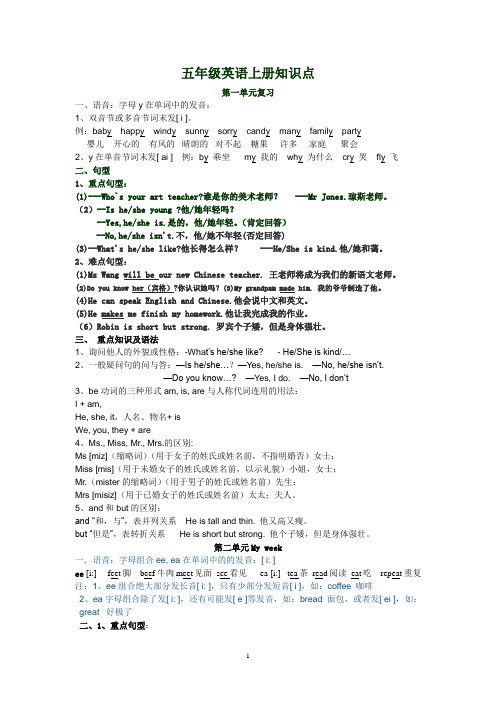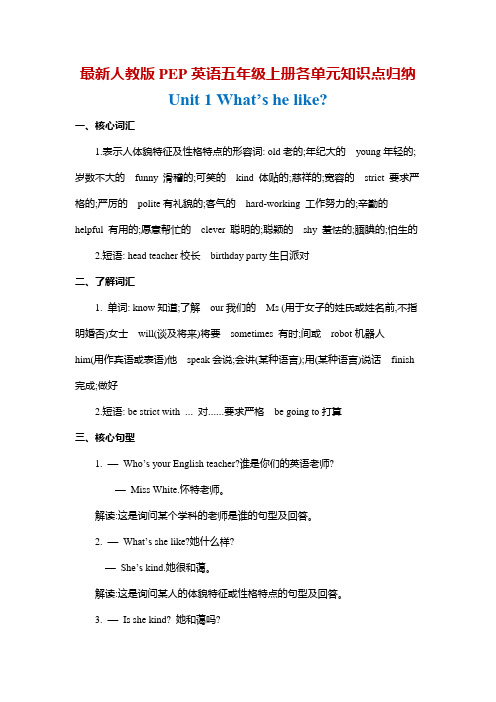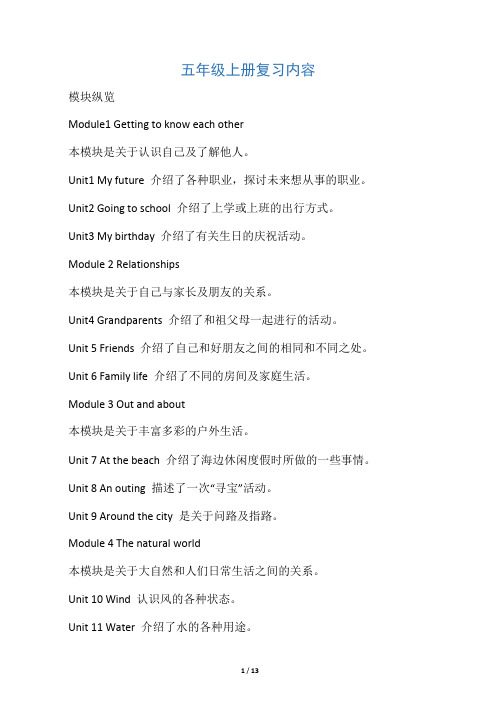五年级英语(上册)各单元知识梳理
英语五年级上册各单元基础知识(带答案)

英语五年级上册各单元基础知识(带答案)五年级英语上册词汇、句子归纳总结unit1whichdoyoulikebetter?词汇:鸡肉chicken鱼肉fish三明治sandwiches汉堡_hamburgers甜甜圈donuts杯型蛋糕cupcakes奶昔milkshake苹果汁applejuice肉meat超市supermarket付款pay英语english语文chinese科学science书法calligraphy体育pe美术art数学maths音乐music学科subject困难的difficult画drawing读书reading养鸟keepbirds种花growflowers扔沙包throwbeanbags跳绳jumprope绵羊sheep熊bear分钟minute写上,放puton句子:1.小鸡鱼,你喜欢哪种鱼?你喜欢哪一种,鸡肉还是鱼?我更喜欢鱼我更喜欢鱼2。
你最喜欢哪门课?你最喜欢哪门课?ilike__chinese___best.idobestin_chinese_______.我最喜欢语文,我语文学的最好。
3.ilike___reading____,butilike_drawing____better.___我喜欢读书,但是我更喜欢画画。
词汇:sorry.ineedtofinishmyhomeworkfirst.抱歉,我要先完成我的作业。
3.thebikeisbroken.shallwefixitthisafternoon?自行车坏了,下午我们一起修一下好吗?yes,let’s.好的,我们一起修吧。
第三单元中秋节还有什么值得纪念的吗?词汇:中秋节themid-autumnfestival重阳节thedoubleninthfestival元宵节thelanternfestival端午节thedragonboatfestival春节thespringfestival农历thechinesecalendar万圣节halloween感恩节thanksgiving复活节easter圣诞节christmas短语:全家人聚在一起吃月饼和水果享受满月爬山探望爷爷看望客人穿好衣服敲门敲门说“不给糖就捣蛋”寻找复活节彩蛋有窝蛋句子:1.whenisthemid-autumnfestival/thedoubleninthfestival?中秋节/重阳节在什么时候?这是中国日历上的第十五天。
小学五年级上册英语知识点

小学五年级上册英语知识点一、词汇与拼写1. 掌握基本的英语单词和常用表达2. 熟悉常用的英语词汇和拼写规则3. 学会利用英语词汇构建简单的句子二、语法知识1. 名词:掌握名词的单复数形式及其用法,如可数名词与不可数名词的区别2. 代词:了解人称代词与物主代词的使用方法,如I, he, she, it, my, your等3. 动词:掌握常见动词的基本形式和过去式,如go-went, eat-ate等4. 形容词和副词:学会形容事物特征和表示程度的词语,如happy, sad, fast等5. 冠词:了解冠词a和an的使用规则,如a book, an apple等6. 介词:熟悉常见的介词及其用法,如in, on, at等7. 时态:掌握一般现在时和一般过去时的基本用法,如I play, He played等8. 疑问句和否定句:了解一般疑问句和否定句的构成,如Do you like? No, I don't等三、听力技巧1. 听懂简单的英语对话和指令2. 学会通过听力材料获取基本的信息和理解意思3. 提高听辨英语音标和各种语音的能力四、口语表达1. 提高口语表达的流利度和准确度2. 学会用简单的句子进行日常生活对话3. 表达自己的感受、意见和需求五、阅读理解1. 阅读简短的英语文章,了解文章基本内容2. 掌握提取关键信息的能力,如答案所在的句子或段落3. 学会利用已知信息推断文章中未知的内容六、写作技巧1. 能够书写简单的英文句子和段落2. 学会运用所学词汇和语法知识进行简单的组织与表达3. 提高书写规范性和准确性,注意基本的拼写和标点符号使用小学五年级上册英语知识点总结完毕。
以上内容主要涵盖了词汇与拼写、语法知识、听力技巧、口语表达、阅读理解和写作技巧等方面的内容。
通过学习这些知识点,学生们能够提高英语听说读写的能力,为今后的学习打下坚实的基础。
希望大家能够在学习过程中不断积累,勇于表达,逐渐提升自己的英语水平。
五年级上册第一至六单元知识点

五年级英语上册知识点第一单元复习一、语音:字母y在单词中的发音:1、双音节或多音节词末发[ i ]。
例:baby happy windy sunny sorry candy many family party 婴儿开心的有风的晴朗的对不起糖果许多家庭聚会2、y在单音节词末发[ ai ] 例:by 乘坐my 我的why 为什么cry 哭fly 飞二、句型1、重点句型:(1)---Who`s your art teacher?谁是你的美术老师? ---Mr Jones.琼斯老师。
(2)--Is he/she young ?他/她年轻吗?--Yes,he/she is.是的,他/她年轻。
(肯定回答)--No,he/she isn't.不,他/她不年轻(否定回答)(3)--What's he/she like?他长得怎么样? ---He/She is kind.他/她和蔼。
2、难点句型:(1)Ms Wang will be our new Chinese teacher. 王老师将成为我们的新语文老师。
(2)Do you know her(宾格)?你认识她吗?(3)My grandpam made him. 我的爷爷制造了他。
(4)He can speak English and Chinese.他会说中文和英文。
(5)He makes me finish my homework.他让我完成我的作业。
(6)Robin is short but strong. 罗宾个子矮,但是身体强壮。
三、重点知识及语法1、询问他人的外貌或性格:-Wha t’s he/she like?- He/She is kind/…2、一般疑问句的问与答:—Is he/she…?—Yes, he/she is. —No, he/she isn’t.—Do you know…?—Yes, I do. —No, I don’t3、be动词的三种形式am, is, are与人称代词连用的用法:I + am,He, she, it,人名、物名+ isWe, you, they + are4、Ms., Miss, Mr., Mrs.的区别:Ms [miz](缩略词)(用于女子的姓氏或姓名前,不指明婚否)女士;Miss [mis](用于未婚女子的姓氏或姓名前,以示礼貌)小姐,女士;Mr.(mister的缩略词)(用于男子的姓氏或姓名前)先生;Mrs [misiz](用于已婚女子的姓氏或姓名前)太太;夫人。
最新人教版PEP英语五年级上册各单元知识点归纳

最新人教版PEP英语五年级上册各单元知识点归纳Unit 1 What’s he like?一、核心词汇1.表示人体貌特征及性格特点的形容词: old老的;年纪大的young年轻的;岁数不大的funny 滑稽的;可笑的kind 体贴的;慈祥的;宽容的strict 要求严格的;严厉的polite有礼貌的;客气的hard-working 工作努力的;辛勤的helpful 有用的;愿意帮忙的clever 聪明的;聪颖的shy 羞怯的;腼腆的;怕生的2.短语: head teacher校长birthday party生日派对二、了解词汇1. 单词: know知道;了解our我们的Ms (用于女子的姓氏或姓名前,不指明婚否)女士will(谈及将来)将要sometimes 有时;间或robot机器人him(用作宾语或表语)他speak会说;会讲(某种语言);用(某种语言)说话finish 完成;做好2.短语: be strict with …对……要求严格be going to打算三、核心句型1. —Who’s your English teacher?谁是你们的英语老师?—Miss White.怀特老师。
解读:这是询问某个学科的老师是谁的句型及回答。
2. —What’s she like?她什么样?—She’s kind.她很和蔼。
解读:这是询问某人的体貌特征或性格特点的句型及回答。
3. —Is she kind? 她和蔼吗?—Yes, she is.是的,她和蔼。
解读:这是询问某人性格特点的一般疑问句,用yes或no回答。
4. He is very helpful at home.他在家里非常愿意帮忙。
解读:这是描述他人特征的句型。
四、了解句型1. Hey, Ms Wang will be our new Chinese teacher.嘿,王老师将会是我们的新语文老师。
解读: will表示将要发生的动作或状态,意思是“将要”,后加动词原形。
五年级上册英语课本知识点总结

五年级上册英语课本知识点总结第一单元单元课题:What’s he like主要内容:(1)三会单词(听说读)know, our, Ms, will, sometimes, robot, him, speak, finish(2)四会单词(听说读写)old, young, funny, kind, strict, polite, hard-working, helpful, clever, shy(3)四会句型①——Is He/ she…——Yes, he/ she is. ——No, he/ she isn’t.②——What’s he / she like——He’s/ She’s…(4)重点语法点①动词的第三人称单数。
②以系动词is开头的一般疑问句:——Is he/ she…——Yes, he/ she is. ——No, he/ she isn’t.eg. ——Is he funny.——Yes, he is.③特殊疑问词what引导的特殊疑问句,询问他人的外貌和个性:——What’s he/ she like——He’s/ She’s…第二单元单元课题:My week主要内容:(1)三会单词(听说读)cooking, often, park, tired, sport, should, every, day, schedule (2)三会短语play sports(3)四会单词(听说读写)Monday, Tuesday, Wednesday, Thursday, Friday, Saturday,Sunday, weekend, wash, watch, do, read, play(4)四会短语wash my cloths, watch TV, do homework, read books, play football(5)四会句型——What do you have on…——I have…——Do you often …——Yes, I do./ No, I don’t.(6)重点语法点①in, on, at后面跟表示时间的词语时,表示某年、某月或某时间段,用in;表示在某日、在星期几时用on;表示在几点几分用at。
五年级上册英语 1-3单元知识点汇总

五年级上册英语1-3单元知识点汇总Unit1 What's he like?1.Do you know Mr Young?你认识杨先生吗?2.Who is he?他是谁?3.—Is he young?他年轻吗?—No,he isn't.不,他不年轻。
4.Ms Wang will be our new Chinese teacher.王女士将成为我们的新语文老师。
5.—What's she like?她什么样?—She's kind.她很和蔼。
1.old老的;年纪大的2.young年轻的;岁数不大的3.funny滑稽的;可笑的4.kind体贴的;慈祥的;宽容的5.strict要求严格的;严厉的6.polite有礼貌的;客气的7.hard—working工作努力8.helpful有用的;愿意帮忙的9.clever聪明的;聪颖的10.shy羞怯的;腼腆的;怕生的1.at home在家2.head teacher校长【原文】1.—Do you know Mr Young?你认识杨先生吗?—No,I don't.不,我不认识。
2.—Is he young?他年轻吗?—No,he isn't.不,他不年轻。
【简析】一般疑问句通常以be动词、助动词或情态动词开头,能够用yes或no开头的简单句来回答。
Unit 2 My week1.—What do you have on Thursdays?星期四你有什么课?—l have maths,English and music.我有数学、英语和音乐课。
2.—Do you often read books in this park?你经常在这个公园里看书吗?—No,I don't.不,我不经常在这里看书。
3.What do you often do on the weekend?周末你经常做什么?1.Monday星期一2.weekend周末3.Thursday星期四4.Wednesday星期三5.Sunday 星期日6.Saturday_星期六7.watch看8.wash洗9.Tuesday星期二10.read看;读11.Friday_星期五12.do做;干13.play踢;玩;参加(体育运动)1.play sports做体育运动2.read books看书3.on the weekend在周末4.on Wednesdays在星期三5.look at看6.have maths有数学课7.listen to music听音乐8.wash my clothes洗我的衣服9.watch TV看电视10.do homework做作业11.draw pictures画画12.clean my room打扫我的房间13.play the pipa弹琵琶14.play football踢足1.—What do you have on Thursdays?星期四你有什么课?—l have maths,English and music.我有数学、英语和音乐课。
最新人教精通版小学英语五年级上册单元知识点总结(全册)

Unit 1 Wehavenewfriends.一、核心词汇hello 喂;嗨(招呼用语) hi 喂;嗨(招呼用语) I 我 you 你;你们 your 你的;你们的 am 是 is 是 are 是 I'm=Iam what's=whatis where 哪里 what 什么 from 从 name 名字二、拓展词汇Britain 英国 Australia 澳大利亚 NewZealand 新西兰 France 法国 Germany 德国Russia 俄罗斯 city 城市 road 道路 street 街道三、核心句型1.I'mBob.I'meleven.IcomefromBritain. 我是鲍勃。
我 11 岁了。
我来自英国。
解读 :这是作自我介绍的最普通的一组句子,介绍自己的名字、年龄和出处。
举一反三 :I'mBen.I'mten.IcomefromBritain. 我是本。
我 10 岁了。
我来自英国。
2.— Whereareyoufrom? 你来自哪里 ?— I'mfromChina. 我来自中国。
解读 :这是用来询问对方来自哪里的句子。
举一反三 : — Whereareyoufrom? 你来自哪里 ?— I'mfromFrance. 我来自法国。
3.— Wheredoyoucomefrom? 你来自哪里 ?— IcomefromNewZealand. 我来自新西兰。
解读 :这也是用来询问对方来自哪里的句子。
举一反三 : — Wheredoyoucomefrom? 你来自哪里 ?— IcomefromChina. 我来自中国。
4.— What'syourname? 你的名字是什么 ?— MynameisCarl. 我的名字是卡尔。
解读 :此句是用来询问对方名字的句子。
举一反三 : — What'syourname? 你的名字是什么 ?— MynameisAmy. 我的名字是埃米。
牛津英语五年级上册知识点整理

五年级上册复习内容模块纵览Module1 Getting to know each other本模块是关于认识自己及了解他人。
Unit1 My future 介绍了各种职业,探讨未来想从事的职业。
Unit2 Going to school 介绍了上学或上班的出行方式。
Unit3 My birthday 介绍了有关生日的庆祝活动。
Module 2 Relationships本模块是关于自己与家长及朋友的关系。
Unit4 Grandparents 介绍了和祖父母一起进行的活动。
Unit 5 Friends 介绍了自己和好朋友之间的相同和不同之处。
Unit 6 Family life 介绍了不同的房间及家庭生活。
Module 3 Out and about本模块是关于丰富多彩的户外生活。
Unit 7 At the beach 介绍了海边休闲度假时所做的一些事情。
Unit 8 An outing 描述了一次“寻宝”活动。
Unit 9 Around the city 是关于问路及指路。
Module 4 The natural world本模块是关于大自然和人们日常生活之间的关系。
Unit 10 Wind 认识风的各种状态。
Unit 11 Water 介绍了水的各种用途。
Unit 12 Fire 介绍了一些基本的防火知识。
第一单元复习词组Jump into the lake fly a plane cook nice food(be)afraid of flying help people drive a taxi(be)good at...句型用What do you want to be ?询问对方将来想从事的职业。
用I want to be ...及I want to (do)...介绍自己未来想从事的职业及理由。
难点1)当句子主语为第三人称单数时,动词要做适当的变化。
2)want to do 与want to be 的正确用法。
- 1、下载文档前请自行甄别文档内容的完整性,平台不提供额外的编辑、内容补充、找答案等附加服务。
- 2、"仅部分预览"的文档,不可在线预览部分如存在完整性等问题,可反馈申请退款(可完整预览的文档不适用该条件!)。
- 3、如文档侵犯您的权益,请联系客服反馈,我们会尽快为您处理(人工客服工作时间:9:00-18:30)。
五年级英语(上册)各单元知识梳理Unit 1知识梳理【单词】1. bear 熊2. forest 森林3. there (与be连用)有4. house 房子5. soup 汤6. room 房间7. hard 硬的8. soft 软的9. afraid 害怕的10. her 她(宾格)11. Help! 救命啊!12. beside 在...旁边13. between 在...中间14. under 在...下面15. behind 在....后面16. really 真的17. then 然后18. find 找到,发现19. their 他们的;她们的;它们的【词组】1.in the forest 在森林里2. a beautiful house 一栋漂亮的房子3. in the house 在房子里4. hungry and thirsty 又饿又渴5. too cold 太冷6. too hot 太热7. just right 正好,刚好8. on the table 在桌子上9. in the room 在房间里10. too hard 太硬11. too soft 太软12. be afraid 害怕的13. three bears 三只熊14. in front of her 在她面前15. on the chair 在椅子上16. a glass of milk 一杯牛奶17. have a cold 感冒18. put on your coats 穿上你(们)的外套19. in Western countries 在西方国家20. in China 在中国21. have some cakes 吃些蛋糕22. in the kitchen 在厨房里23. in the fridge 在冰箱里24.find their cousin 找到他们的外甥25. in the living room 在客厅26. some toy cars 一些玩具车27. three umbrellas 三把雨伞28. in the glass 在杯子里29. in the tree 在树上30. in the box 在盒子里【句子】1.There is a house. 有一栋房子。
2.There is some soup on the table. 桌子上有些汤。
3.This soup is too cold / hot. 这个汤太冷/热了。
4.This soup is just right. 这个汤刚好。
5.There are three beds in the room. 房间里有三张床。
6.This bed is too hard / soft. 这张床太硬/软。
7.There are three bears in front of her! 在她面前有三只熊。
8.Who are you? 你是谁?9.Do you remember these words? 你记得这些单词吗?10.Coffee is popular in Western countries. 咖啡在西方国家流行。
11.Tea is popular in China. 茶在中国流行。
12.Bobby cannot see any cakes in the fridge. Bobby 在冰箱里看不到任何蛋糕。
13.There aren’t any cakes here. 这里没有任何蛋糕。
14.Here are the cakes. 蛋糕在这里。
【语法知识】1. There is+(a/an)可数名词单数/(some)不可数名词+地点。
There is a house in the forest.There is an apple on the table.There is some milk in the glass.1.There are + (超过“两”的数字/some)可数名词复数+地点。
There are three bears in front of her.There are some cakes in the kitchen.2.there be 句型遵循“就近原则”。
There is a girl and some boys in the classroom.There are some boys and a girl in the classroom.[辨析]there be 和have 两者都表示“有”,它们有什么区别呢?have 常用来表示某人拥有的东西,而there is / are常用来表示在某个地方有什么东西。
如:We have a computer room. 我们有一间电脑房。
There is a computer room in our school. 我们学校有一间电脑房。
Unit 2 知识梳理【单词】1. student 学生2. classroom 教室3. second 第二4. floor 楼层5. computer 电脑6. third 第三7. first 第一8. swing 秋千9. push 推10. heavy 重的,沉的11. stop 停下,停止12. high 高的13. great 很多的,极大的【词组】1. a new student 一名新学生2. show ....around 带...参观3. how many 多少4. on the second floor 在二楼5. in the classroom在教室6. an art room 一间美术教室7. on the third floor 在三楼8. two music rooms 两间音乐教室9. on the first floor 在一楼10. a table tennis room 一间乒乓球室11. go and have a look 去看一看12. in her new school 在她的新学校13. sing and dance 唱歌跳舞14. drink some nice juice 喝些好喝的果汁15. go to the cinema 去电影院16. have an ice cream 吃个冰淇凌17. the ground floor 一楼(英国)18. the first floor 一楼(美国)19. in the playground 在操场上20. go and play 去玩21. on the swing 在秋千上22. push me 推我23. so heavy 这么重24. too high 太高25. great fun 极大的乐趣26. play again 再玩一次27. three libraries 三间图书馆28. at school 在学校【句子】1.Nancy is a new student. Nancy是个新学生。
2.Can you show her around? 你能带她四处看看吗?3.How many classrooms are there in our school? 我们学校有多少间教室?4.Are there any music rooms? Yes, there are. / No, there aren’t. 有美术教室吗?是的,有。
/ 不,没有。
5.There are two computer rooms. 有两个电脑教室。
6.They’re on the third floor. 它们在三楼。
7.Is there a music room? Yes, there is. / No, there isn’t. 有音乐教室吗?是的,有。
/ 不,没有。
10. It’s on the first floor. 它在一楼。
11. The table tennis room is on the first floor too. 乒乓球教室也在一楼。
12. Let’s go and have a look. 让我们去看一看。
13. There is an art room on the third floor. 三楼有一间美术教室。
14. How many desks and chairs are there in the classroom?教室里有多少张桌子和多少把椅子?15. Are there any classrooms on the third floor? 三楼有些教室吗?16. Are there any libraries on the fourth floor? 四楼有些图书馆吗?17. It’s great fun! 太好玩了!18. It’s time for dinner. =It’s time to have dinner. 该吃晚饭的时候了。
19. Let’s go home now. 让我们现在回家吧。
【语法知识】1.Is / Are there...?有....吗?[归纳]a) There be 句型的一般疑问句形式是把be动词提前,在肯定句中用some的地方要改为any。
1)Is there + a / an 可数名词单数+地点?Is there a playground in the school? 学校有一个操场吗?Is there an apple on the table? 桌上有个苹果吗?2)Is there + any不可数名词+地点?Is there any bread in the kitchen? 厨房有面包吗?3)Are there+any可数名词复数+地点?Are there any pictures in the classroom? 教室里有些图片吗?b) There be 句型的否定句是在be动词后面加not, 在肯定句中用some的地方要改为any。
1) There is not +a/ an 可数名词单数+地点。
There isn’t a library in mu school. 我们学校没有图书馆。
There isn’t an umbrella in the classroom. 教室里没有一把雨伞。
2) There isn’t + any 不可数名词+地点。
There isn’t any milk in the glass. 杯子里没有牛奶。
3)There are not +any +可数名词复数+地点。
There aren’t any cakes in the fridge. 冰箱里没有任何蛋糕。
